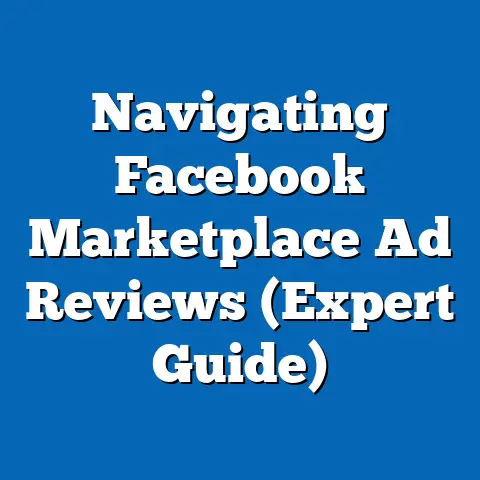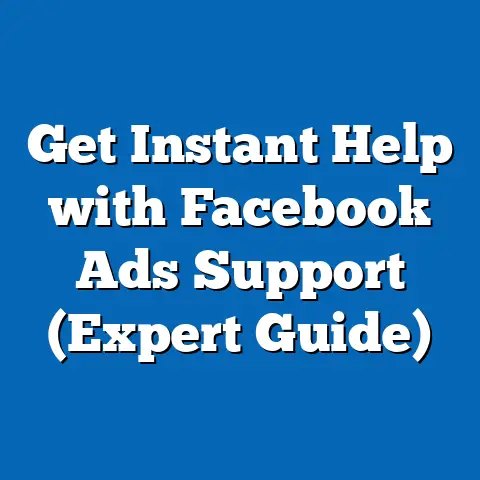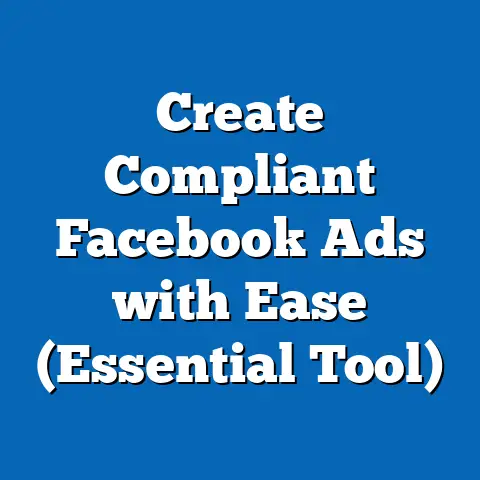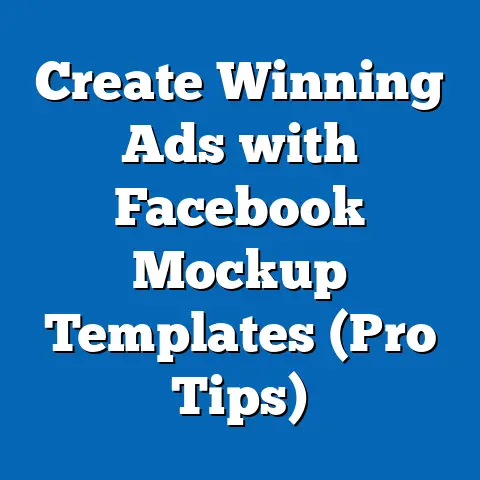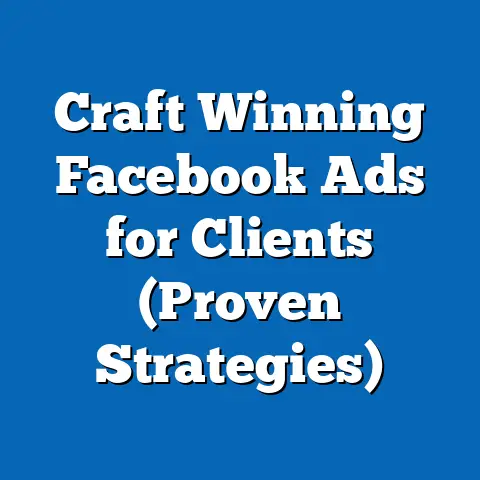How Often Does Facebook Ad Manager Update? (Key Insights)
In the ever-evolving world of digital marketing, staying ahead of the curve can feel like a constant uphill battle.
As marketers and advertisers, we’re bombarded with new trends, algorithm changes, and platform updates that demand our attention.
One tool that’s absolutely crucial for navigating this landscape is Facebook Ad Manager.
But, just when you think you’ve mastered its intricacies, it changes again!
This raises a vital question: How often does Facebook Ad Manager update, and what impact does it have on our campaigns?
I remember when I first started running Facebook ads for a local bakery.
I spent weeks perfecting my targeting, crafting compelling ad copy, and optimizing my budget.
Everything was running smoothly, and then BAM!
An update rolled out, changing the way audience insights were presented.
Suddenly, my meticulously crafted audience segments seemed less clear, and I had to scramble to re-evaluate my strategy.
This experience, and countless others like it, have taught me the importance of understanding the update cycle of Facebook Ad Manager.
This article will delve deep into the frequency and nature of updates within Facebook Ad Manager.
We’ll explore the types of changes you can expect, the impact these updates have on your campaigns, and how you can stay ahead of the curve to maximize your advertising ROI.
Understanding Facebook Ad Manager
Facebook Ad Manager is the central hub for creating, managing, and analyzing your Facebook and Instagram advertising campaigns.
Think of it as your command center for reaching your target audience, driving conversions, and achieving your business goals on these powerful social media platforms.
It’s much more than just a tool for placing ads; it’s a comprehensive platform that provides a range of essential functions:
- Ad Creation: Ad Manager allows you to design your ads with various creative elements, including images, videos, and compelling ad copy.
You can choose from various ad formats, from simple image ads to immersive video experiences and interactive Instant Experiences. - Audience Targeting: One of the most powerful features of Ad Manager is its robust targeting capabilities.
You can target specific demographics, interests, behaviors, and even custom audiences based on your existing customer data.
This ensures your ads reach the people most likely to be interested in your products or services. - Budget Management: Ad Manager lets you set your budget and bidding strategy, giving you control over your ad spend.
You can choose between daily or lifetime budgets and select from various bidding options, such as automatic bidding or manual bidding, to optimize your campaigns for specific objectives. - Performance Tracking: Monitoring your ad performance is crucial for optimizing your campaigns.
Ad Manager provides detailed reports and analytics, allowing you to track key metrics like impressions, reach, clicks, conversions, and cost-per-result.
This data helps you identify what’s working and what’s not, enabling you to make data-driven decisions to improve your results.
Whether you’re a small business owner running your first Facebook ad or a seasoned marketing professional managing large-scale campaigns, Facebook Ad Manager is an indispensable tool.
It provides the features and insights you need to connect with your target audience, drive meaningful results, and grow your business.
The Update Mechanism of Facebook Ad Manager
Facebook Ad Manager isn’t a static tool; it’s constantly evolving to meet the changing needs of advertisers and the broader digital landscape.
These updates come in various forms, each with its own impact on your campaigns and overall user experience.
Here’s a breakdown of the types of updates you can expect:
- Feature Enhancements: These updates introduce new functionalities and improvements to existing features within Ad Manager.
This could include new ad formats, advanced targeting options, or streamlined workflows for creating and managing campaigns. - Bug Fixes: Like any complex software, Ad Manager is prone to occasional bugs and glitches.
Bug fix updates address these issues, ensuring the platform runs smoothly and reliably. - Algorithm Changes: The Facebook algorithm plays a crucial role in determining which ads are shown to which users.
Algorithm updates can significantly impact ad delivery, targeting accuracy, and overall campaign performance.
Facebook typically follows a structured process when rolling out updates to Ad Manager:
- Beta Testing: Before releasing updates to the general public, Facebook often conducts beta testing with a select group of advertisers.
This allows them to gather feedback, identify potential issues, and refine the updates before a wider release. - Gradual Rollout: Once the beta testing phase is complete, Facebook usually rolls out updates gradually to different segments of its user base.
This allows them to monitor the impact of the changes and address any unforeseen issues before they affect all advertisers. - Feedback Mechanisms: Facebook provides various channels for advertisers to provide feedback on updates, including surveys, forums, and direct communication with their support team.
This feedback is invaluable for shaping future updates and ensuring the platform meets the needs of its users.
To illustrate the frequency and impact of these changes, let’s look at some notable past updates:
Frequency of Updates
Now, let’s get to the core question: How often does Facebook Ad Manager actually update?
The answer, unfortunately, isn’t a simple one.
Facebook doesn’t publish a fixed schedule for updates, and the frequency can vary depending on the type of update and the overall priorities of the platform.
However, based on my experience and observations over the past few years, here’s a general guideline:
- Major Updates: These are significant changes that introduce new features, overhaul existing functionalities, or address major issues.
Major updates typically occur a few times per year, perhaps every quarter or every few months.
These are the updates that often grab headlines and require advertisers to make significant adjustments to their strategies. - Minor Tweaks: These are smaller changes that address bug fixes, refine existing features, or improve the user interface.
Minor tweaks are much more frequent, often occurring several times per month.
While they may not be as disruptive as major updates, they can still have a noticeable impact on your campaigns.
To give you a clearer picture, let’s look at some data from the past year:
- Q1 2023: Facebook rolled out several updates focused on improving campaign performance and simplifying the ad creation process.
This included enhancements to the Advantage+ campaign budget and new ad format options. - Q2 2023: The focus shifted towards privacy and data security, with updates aimed at complying with evolving regulations and protecting user data.
This included changes to tracking and attribution methods. - Q3 2023: Facebook introduced new AI-powered features designed to automate and optimize various aspects of advertising, such as audience targeting and ad creative.
- Q4 2023: The platform focused on improving the user experience, with updates that streamlined the interface and made it easier for advertisers to navigate the platform.
It’s important to note that these are just examples, and the actual frequency and focus of updates can vary from year to year.
To stay informed about the latest updates, I recommend following these strategies:
- Subscribe to Facebook’s Official Communications: Facebook often announces major updates through their official blog, newsletters, and social media channels.
- Follow Industry Experts: Many digital marketing experts and influencers regularly share insights and analysis on Facebook Ad Manager updates.
- Join Online Communities: Online forums and communities dedicated to Facebook advertising are great places to discuss updates, share tips, and learn from other advertisers.
- Regularly Check the “What’s New” Section in Ad Manager: Facebook often includes a “What’s New” section within Ad Manager, highlighting recent changes and updates.
By staying informed and proactive, you can minimize the impact of updates on your campaigns and maximize your advertising ROI.
The Impact of Updates on Advertisers
Facebook Ad Manager updates aren’t just technical changes; they can have a real and measurable impact on your advertising campaigns.
Understanding these potential impacts is crucial for adapting your strategies and maintaining optimal performance.
Here are some of the ways updates can affect advertisers:
- Campaign Performance: Updates can directly influence key metrics like impressions, reach, clicks, conversions, and cost-per-result.
For example, an algorithm change that prioritizes certain types of content could lead to a decrease in reach for ads that don’t align with the new algorithm. - Targeting Accuracy: Changes to targeting options can affect your ability to reach your desired audience.
For instance, if Facebook removes a specific interest category, you may need to adjust your targeting to find alternative ways to reach those users. - Reporting Accuracy: Updates can impact the accuracy of your reporting data.
Changes to attribution models or tracking methods can affect how conversions are attributed to your ads, making it difficult to accurately assess your ROI. - User Experience: Updates can alter the user interface and workflows within Ad Manager, potentially making it more difficult to navigate the platform and manage your campaigns.
To illustrate these impacts, let’s look at a couple of case studies:
- Case Study 1: The E-commerce Store Adapting to iOS 14: An e-commerce store selling handmade jewelry relied heavily on Facebook ads for driving sales.
When Apple’s iOS 14 update rolled out, their tracking accuracy plummeted, making it difficult to attribute conversions to their ads.
To adapt, they implemented server-side tracking, verified their domain, and focused on building first-party data to improve their targeting. - Case Study 2: The Local Restaurant Benefiting from Advantage+ Campaign Budget: A local restaurant struggled to manage their ad budget effectively across multiple ad sets.
When Facebook introduced the Advantage+ campaign budget, they decided to give it a try.
The AI-powered feature automatically distributed their budget across the best-performing ad sets, resulting in a significant increase in conversions and a lower cost-per-result.
These case studies highlight the importance of staying informed about updates and adapting your strategies accordingly.
Advertisers who are proactive and willing to experiment with new features are more likely to thrive in the ever-changing landscape of Facebook advertising.
On the other hand, advertisers who ignore updates or fail to adapt their strategies may face significant challenges, including:
- Decreased Campaign Performance: Outdated targeting options and ad formats can lead to lower engagement and conversion rates.
- Wasted Ad Spend: Inaccurate tracking and reporting can result in inefficient budget allocation and wasted ad spend.
- Increased Costs: Stricter privacy regulations and algorithm changes can drive up the cost of advertising, making it more difficult to achieve a positive ROI.
By staying informed and adaptable, you can turn potential challenges into opportunities and maximize your advertising success on Facebook.
Key Features to Watch for in Updates
While every update to Facebook Ad Manager is important, some features are more frequently updated and have a greater impact on your campaigns.
Keeping a close eye on these features can help you stay ahead of the curve and optimize your strategies for maximum results.
Here are some key features to watch for in updates:
- Audience Targeting: Facebook is constantly refining its audience targeting options, adding new interest categories, demographic data, and behavioral targeting options.
These updates can help you reach more specific and niche audiences, improving your ad relevance and conversion rates. - Ad Formats: Facebook regularly introduces new ad formats designed to engage users in innovative ways.
Staying up-to-date on these new formats can help you create more compelling and effective ads. - Metrics and Reporting Tools: Facebook is always working to improve its metrics and reporting tools, providing advertisers with more accurate and insightful data.
Monitoring these updates can help you better understand your campaign performance and identify areas for improvement. - Campaign Budget Optimization: Facebook’s campaign budget optimization features are constantly evolving, leveraging machine learning to automatically distribute your budget across ad sets and optimize for specific objectives.
Keeping track of these updates can help you streamline your budget management and improve overall campaign performance. - Attribution Models: Facebook’s attribution models determine how conversions are attributed to your ads.
Changes to these models can significantly impact your reporting data and your ability to accurately assess your ROI.
To monitor these features and leverage them for better results, I recommend the following strategies:
- Regularly Review the “What’s New” Section in Ad Manager: Facebook often highlights recent changes and updates in the “What’s New” section within Ad Manager.
- Experiment with New Features: Don’t be afraid to try out new features and ad formats.
This is the best way to learn how they work and how they can benefit your campaigns. - Analyze Your Data: Pay close attention to your campaign performance data and look for trends and patterns that may be related to recent updates.
- Stay Informed: Follow industry experts, join online communities, and subscribe to Facebook’s official communications to stay up-to-date on the latest news and updates.
By actively monitoring these key features and adapting your strategies accordingly, you can maximize your advertising success on Facebook.
The Future of Facebook Ad Manager Updates
Looking ahead, what can we expect from Facebook Ad Manager updates in the future?
While it’s impossible to predict the future with certainty, we can make some educated guesses based on current trends and Facebook’s overall direction as a company.
Here are some potential innovations on the horizon that could reshape how advertisers interact with the platform:
To prepare for these future updates, I recommend the following strategies:
- Stay Curious: Keep an open mind and be willing to experiment with new technologies and approaches.
- Invest in Learning: Continuously expand your knowledge and skills in areas like AI, automation, and XR.
- Build a Strong Data Foundation: Focus on collecting and managing first-party data to improve your targeting and attribution accuracy.
- Stay Agile: Be prepared to adapt your strategies quickly in response to changing market conditions and platform updates.
By embracing these strategies, you can future-proof your advertising efforts and stay ahead of the curve in the ever-evolving world of Facebook advertising.
Conclusion
Understanding how often Facebook Ad Manager updates is crucial for any marketer who wants to run successful campaigns.
It’s not just about knowing the features; it’s about anticipating changes and adapting your strategy accordingly.
Remember my bakery story?
It taught me that complacency is the enemy in digital marketing.
From the frequency of major and minor updates to the potential impact on campaign performance and the future of AI-driven advertising, we’ve covered a lot of ground in this article.
The key takeaway is this: stay informed, stay adaptable, and stay proactive.
By embracing these principles, you can turn the challenges of constant updates into opportunities for growth and innovation.
The world of Facebook advertising is constantly evolving, but with the right knowledge and strategies, you can thrive and achieve your business goals.
So, keep learning, keep experimenting, and keep pushing the boundaries of what’s possible.
The future of Facebook advertising is bright, and I’m excited to see what you’ll accomplish!

